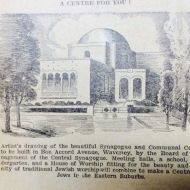Pray
The importance of prayer in Jewish culture
Why Waverley?
In the post-war period Waverley was an attractive destination for Jewish migrants due to the presence of synagogues, kosher butchers, bakers, restaurants and Jewish schools. When Jewish migrants arrived they found a community which allowed them religious and social freedom.
While most Australian Jews have a strong Jewish identity, it is not necessarily expressed through religious practice. The continuity of Jewish ideas and values is evident, for example, in the community’s emphasis on Jewish education and in most people’s commitment to serving the community.
“Judaism is very much focused around, first, the individual, the family and the community. Even when we talk about prayer, there's a quorum to be able to recite certain prayers called the minyan, which is 10 men. When people are eating together, if there's three people who have eaten together, then there's a sense of the blessing of thanks afterwards; [it] takes on a special extra meaning.”
Rabbi Mendel Kastel, migrated from the USA in 1988
Three main streams of Judaism are active today in Australia: Orthodox, Conservative and Reform.
Most Australian Jews are of Ashkenazi origin, originating in the main from Britain, Continental Europe and the former USSR. There is also a significant Sephardic Jewish population, Jews originally from Spain who fanned out over the Arabic-speaking world and came to Australia largely from Iraq, India, Singapore, Burma and other countries of Asia.
Religious practices before migrating
Many participants recall how in their countries of origin they had to hide their faith, so that many didn't find their religion again until after the War. Soviet Jews and Holocaust survivors in particular had to hide their religion or practice in secret.
“My mother used to light the candles, Friday night candles, in a room and she trusted me enough to make it our secret and that was the special thing between her and me.”
Jody Somogy, migrated from Hungary in 1960
“My father, who was a dentist, got false papers and he found a village that was looking for a dentist and that's where we spent the rest of the war years, living under false papers pretending we were Catholic. We were the only non-Catholics in that village. We were hoping that the locals wouldn't guess. They actually did and it was only thanks to the support of the village priest that we survived the war in that village.”
Diane Armstrong, migrated from Poland in 1948
Rituals and observances
Jewish holy days are full of tradition and rich in history. Many say that by practicing these rituals they feel connected to their past.
Shabbat
Shabbat is considered the most important of all Jewish holidays and it is the most important day of the week for Jews when the week work cycle stops and families gather to pray and eat. Even families who don’t as a rule go to synagogue will be found celebrating the Shabbat with family and friends. Shabbat begins at sunset on Friday and ends at nightfall on Saturday.
“The Shabbat dinner is the connection of all of us each week, and truly the reason that we're a united close family. I do believe that.”
Melanie Lindenberg, migrated from South Africa in 1985
Other festivals
There are many other Jewish holy days, but the most commonly observed by Jews are Passover (Pesach), Rosh Hashanah, Yom Kippur and Chanukah.
“My family is very traditionally Jewish and I'm very proud of my history, and I always remember what we've gone through and my parents and everybody has gone through being Jewish... I feel as though that's what made me stronger. I've tried to continue those traditions as best I can and pass on to my children and I think that's made me a good person and a better person.”
Peter Berger, migrated here from Hungary in 1957
Learning from the past
As with many migrant communities, high educational attainment of the next generation has been a priority for Jewish parents. The opportunity to combine education and support in the transmission of the Jewish faith has been a strong motivator within the local community to send its children to Jewish day schools.
Apart from a Jewish education at school the home is where families have a strong intergenerational desire to teach and share their Jewish history and instil respect, Jewish values, pride and tradition in their children and grandchildren.
“I feel really passionate about Jewish education because I feel like that's passing on information, knowledge, customs, traditions to the next generation.”
Elana Benjamin, Australian born; her father migrated here from India in 1966
“When you go back to the very core of what it is to be Jewish in Jewish law, going back thousands of years. It is all about life and leading a good life and a happy life and appreciating what we have, that we're here for such a short period of time, a moment in history we're here, and how to use that, how to appreciate it and how to live good lives, how to love and be loved, these are Jewish values I believe. These are certainly things that my family have passed to me.”




















